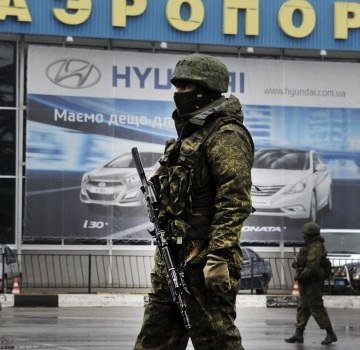Ukraine’s acting president, Oleksander Turchynov, has accused Russian-supported forces in Crimea of “working on scenarios which are fully analogous with Abkhazia.” The notion that the “model” of Abkhazia from the 2008 Russia-Georgia war fits Russia’s moves in Crimea is a theme adopted by many media pundits, as well.
But Abkhazia is not Crimea, and Russian incentives in the two regions do not match. That means that the purported end result from these model predictions — a Russian takeover of Crimean territory — doesn’t have to happen, if Ukraine plays its cards right. Here’s why.
1) Abkhazia suffered a brutal civil war in 1992-3 following the Soviet collapse, and extensive ethnic cleansing campaigns and other atrocities against civilians were carried out by both sides, according to an authoritative Human Rights Watch report. Ethnically Georgian militias were supported by the Georgian state. Ethnically Abkhazian militias were supported both by North Caucasus militants coming over the border from Russia and by the Russian state itself, which provided weapons and training to the fighters and carried out airstrikes against ethnic Georgian targets. According to the International Crisis Group, 8,000 people were killed, 18,000 were wounded, and 240,000 people (predominantly ethnic Georgians) were displaced from their homes. The majority of the displaced remain in separate communities within Georgia proper to this day, and in May 2008 the UN General Assembly called for the right of return for those displaced. Meanwhile, Russian “peacekeepers,” originally authorized by the UN with Georgian acquiescence but showing disturbing signs of offensive activity as the years went by, remained on Abkhazian territory. It is that context — strong irredentist feelings among Georgians (supported by the western and western-leaning international community) coupled with existential security fears on both sides — that set the stage for the 2008 Russian intervention into Abkhazia.
In contrast, Crimea entered the post-Soviet era peacefully. While there was extensive legal wrangling over Crimea’s status within the newly sovereign Ukraine, as scholar Roman Solchanyk described at the time, Crimea managed to avoid civil war. (Crimea had arbitrarily become part of Ukrainian territory in 1954 because of a decision made by Soviet Premier Nikita Khrushchev.) While a majority of Crimeans feel ethnic solidarity with Russians, the republic lacks the emotional memories and resentments of Abkhazia’s post-civil-war society. This means that a peaceful, negotiated solution to Crimea’s ultimate status is much more likely than it ever was for Abkhazia.
2) The Abkhazian population is not predominantly Russian by ethnicity. According to the 2011 official census, fewer than 10 percent of the population identified as Russian; even in Soviet times that figure never exceeded 20 percent. In contrast, over 58 percent of Crimeans self-identify as Russian by ethnicity, according to the most recent Ukrainian census of 2001.
This means that Russia has a level of indirect influence in Crimea that it never had in Abkhazia— it already has the sympathies of a large majority of the population, which will probably be reflected in Crimea’s announced May referendum on autonomy. When that is combined with the strong representation of the Russian ethnic group in several other Ukrainian provinces, as well as Ukraine’s dependence on Russian imports for 70 percent of its natural gas, Russia doesn’t need a costly and risky occupation of Crimea in order to have a guaranteed voice in Ukraine’s future.
3) While the 2008 Georgia war was bloody, it was short, largely because the Georgian military collapsed. In part this was because of the small size and limited equipment of Georgian forces, but the problem went deeper than that. A confidential assessment by the Pentagon just after the war, according to the New York Times, cited “mismanagement and unqualified leadership” that kept Georgian forces from being a “modern fighting force.” When combined with the prior presence of Russian peacekeeping forces on the ground, this helped make Abkhazia easy pickings for Moscow.
In contrast Ukraine has a much more formidable army today than Georgia did in 2008, as I argued in a recent ForeignAffairs.com piece. No sensible, rational Russian leader—and we can assume that President Vladimir Putin is both sensible and rational, given his longevity in office and the variety of his recent foreign policy triumphs — would tempt fate by launching an invasion that provoked a Ukrainian military response.
4) Finally, Georgia in 2008 was led by an impetuous, easily-angered president, Mikheil Saakashvili, who had staked his political future on restoring Georgia’s pre-civil-war territorial integrity. Putin is a master of judo, who understands how to make opponents fall by using their own weight against them. He knew that he could egg on Saakashvili into moving first (as determined by the Council of the European Union independent fact-finding report about the 2008 war).
Here is where Ukraine’s interim leadership can ensure that Crimea does not become Abkhazia, and can thereby forestall a frightening larger war over Ukraine’s territorial future. By remaining calm and doing everything it can to prevent the use of violence against Crimea’s ethnic Russian majority, Kiev can wait Moscow out.
In the long run, as Oxana Shevel has argued here in The Monkey Cage, it is not in Moscow’s interest to be saddled with the costs of governing the complex ethnic mix of Crimea, given its significant Tatar population that is hostile to Russian control. If Kiev makes clear that it can accept a renegotiation of Crimea’s autonomous status within a sovereign Ukrainian state — and especially if Kiev maintains the 2010 bargain it reached with Moscow, allowing Russia’s Black Sea Fleet to remain at its Crimean base of Sevastopol until 2042 — hope remains that the current Crimean crisis can be solved without a Russian invasion.
See the original post © The Monkey Cage










